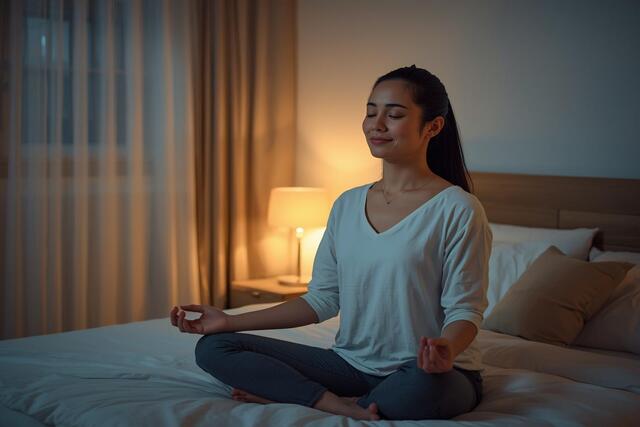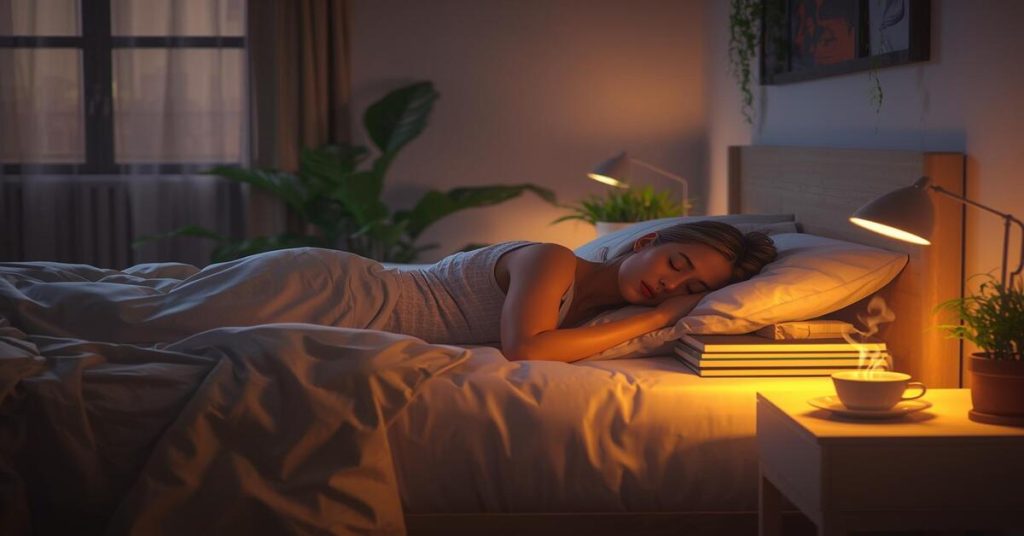Discover the 5 Hidden Connections Between Sleep and Emotional Balance 😴🧠

In today’s fast-paced world, many people overlook the powerful connections between sleep and emotional balance. While most of us know that sleep is essential for physical health, its role in maintaining emotional stability is often underestimated. Poor sleep doesn’t just make you feel tired—it can lead to mood swings, stress, anxiety, and even long-term mental health issues. In this article, we’ll explore how sleep directly impacts emotions, and reveal five hidden connections that can help you transform your mental well-being.
Why Sleep and Emotional Balance Matter Together 🌙
Sleep is more than rest—it is the body’s natural way of recharging the brain and balancing emotions. When you get quality sleep, your brain processes memories, manages stress hormones, and improves resilience. On the other hand, lack of sleep disturbs the brain’s chemistry, leaving you irritable, anxious, or emotionally drained. That’s why understanding the deep connections between sleep and emotional balance is crucial for living a healthier and happier life.
The Science Behind Sleep and Emotions 🔬
Scientific studies show that poor sleep weakens the brain’s prefrontal cortex (responsible for decision-making and emotional regulation) while over-activating the amygdala (linked with fear and stress). This imbalance makes us more reactive to negative emotions. Good sleep, on the other hand, strengthens the brain’s ability to process emotions calmly and rationally. This explains why a night of sound sleep often makes life’s problems feel more manageable the next day.
Read more: Top 9 Secrets of Deep Sleep for Reducing Stress & Anxiety (Backed by Science!)
5 Hidden Connections Between Sleep and Emotional Balance 💡
Now, let’s uncover the five hidden but powerful ways that sleep and emotional balance are linked. Each of these factors plays a vital role in shaping your mental wellness.
1. Sleep Restores Emotional Resilience 🌱
Adequate sleep helps your brain build resilience, meaning the ability to bounce back from stress and emotional challenges. When well-rested, you’re less likely to feel overwhelmed by minor setbacks, and your mind becomes better at problem-solving. Without enough sleep, however, even small issues may seem like major crises. Over time, this can weaken emotional balance and make you more vulnerable to anxiety or depression.
2. Sleep Reduces Stress Hormones 😌
One of the strongest connections between sleep and emotional balance lies in stress regulation. During sleep, cortisol (the stress hormone) levels drop, allowing your body and mind to relax. Poor sleep keeps cortisol high, which leads to irritability, tension, and mood swings. By improving sleep, you give your body the chance to naturally reduce stress, creating a calmer and more emotionally balanced state of mind.
3. Sleep Improves Emotional Memory 🧠
Sleep plays a key role in emotional memory processing. While you sleep, especially during REM cycles, your brain sorts through emotional experiences and stores them properly. This helps you respond to similar situations more appropriately in the future. Without sufficient sleep, emotional memories can get distorted, leading to exaggerated reactions, poor judgment, or difficulty coping with stressful situations.
4. Sleep Enhances Positive Mood 😊
Good sleep doesn’t just prevent negative emotions—it actively boosts positive ones. People who sleep well are more likely to feel optimistic, motivated, and emotionally stable. Quality rest increases serotonin and dopamine, neurotransmitters that elevate mood and happiness. On the flip side, poor sleep drains these chemicals, making it harder to maintain emotional balance and enjoy daily life.
5. Sleep Strengthens Social and Emotional Connections 🤝
One overlooked aspect of sleep is its impact on relationships. Sleep-deprived people often struggle with empathy, communication, and patience. This can strain personal and professional relationships, further harming emotional balance. When you prioritize rest, you not only feel better but also interact more positively with others—strengthening social bonds and creating emotional harmony in your life.
How to Improve Both Sleep and Emotional Balance 🌿
To strengthen the connections between sleep and emotional balance, you can adopt simple lifestyle habits: maintain a regular sleep schedule, create a calming bedtime routine, reduce screen time before bed, and practice relaxation techniques like meditation or deep breathing. Over time, these small steps can make a huge difference in both your sleep quality and emotional stability.
Deep Dive Into the Connections Between Sleep and Emotional Balance 💤🧠
While the hidden connections between sleep and emotional balance are powerful on their own, there are countless ways this relationship extends into daily life. Beyond the five key points we already discussed, let’s explore practical scenarios, lifestyle impacts, cultural insights, and scientific research that further prove how essential sleep is for emotional health.
Think of sleep as the body’s most natural therapy session. Each night, the brain runs through thousands of micro-processes to heal emotions, stabilize mood, and prepare for the challenges of tomorrow. Without quality rest, emotions become fragile, stress rises, and decision-making suffers. In contrast, when you prioritize rest, your emotional world becomes calmer, brighter, and more resilient 🌟.
How Lack of Sleep Shapes Daily Emotions
When sleep deprivation becomes routine, emotional balance starts to collapse. Imagine waking up after only four hours of rest: you may feel irritable, less patient, and overly sensitive to small problems. Science shows that even a single night of poor sleep can increase emotional reactivity by nearly 60%. That means your ability to respond calmly to stressors dramatically declines. Over time, this imbalance increases risks of anxiety, depression, and even emotional burnout.
Read more: 12 Science-Backed Tips to Improve Sleep and Reduce Depression (Ultimate Guide)
Sleep as an Emotional Filter 🧩
Another fascinating aspect of the connections between sleep and emotional balance is how rest acts as a filter. During deep sleep, your brain carefully sorts through emotional experiences, discarding unnecessary stress while keeping meaningful lessons. Without this nightly “emotional housekeeping,” unprocessed feelings accumulate, leaving you emotionally overloaded. This is why after a rough day, “sleeping on it” often makes challenges feel lighter the next morning.
Dreams and Emotional Regulation 🌙
Dreaming is more than random imagination—it’s the brain’s way of working through emotions. REM sleep, in particular, allows the mind to replay emotional experiences in a safe environment. People who skip REM cycles often report increased irritability, sadness, and difficulty coping with real-life situations. Dreams may not always make sense, but they are powerful tools for emotional processing and regulation.
Culture, Sleep, and Emotional Wellness
Different cultures approach sleep in unique ways, and these habits often affect emotional health. For instance, Mediterranean cultures that practice afternoon naps (siestas) report lower stress levels and better mood regulation. In Japan, power naps at work are socially accepted, acknowledging that rest directly improves emotional and cognitive performance. Across the globe, societies that honor sleep as a vital part of life often see stronger community connections and healthier emotional outcomes 🤝. These examples highlight the natural connections between sleep and emotional balance across different lifestyles and traditions.
Technology’s Role in Sleep and Emotional Balance 📱
In the modern digital age, technology is both a blessing and a curse. While meditation apps and sleep trackers can support better rest, excessive screen time disrupts circadian rhythms. The blue light from phones and laptops delays melatonin production, making it harder to fall asleep. Poor sleep then weakens emotional stability, creating a harmful cycle. Learning to balance technology use—such as setting screen curfews or using blue-light filters—can dramatically improve both rest and emotions.
Work Stress, Burnout, and Sleep
One of the strongest real-world examples of the connections between sleep and emotional balance can be seen in workplace burnout. Long hours, constant deadlines, and lack of rest push the mind into a cycle of exhaustion and emotional instability. Studies show employees who sleep fewer than 6 hours per night are 30% more likely to experience workplace conflicts and 40% more likely to report high stress. Prioritizing rest is not just personal self-care—it’s a professional necessity for emotional resilience and success.
Hormones and Emotional Stability
Hormones are deeply tied to sleep cycles. When you don’t sleep well, stress hormones like cortisol rise, while “happy” hormones like serotonin drop. This hormonal imbalance explains why poor sleepers often feel anxious, moody, or emotionally drained. On the other hand, good sleep balances hormone levels, stabilizing emotions naturally. That’s why people who consistently rest well report higher life satisfaction and more emotional control 🙂.
Sleep Across Different Life Stages 👶👩🦳
The connections between sleep and emotional balance also change as we age. Children need more sleep for emotional and cognitive development. Teens often struggle with irregular sleep schedules, which can increase mood swings. Adults balancing work and family often sacrifice rest, leading to emotional strain. Seniors may face fragmented sleep, which can influence memory and emotional regulation. Understanding these age-related patterns helps individuals take proactive steps for better emotional health through improved sleep.
Practical Tips to Strengthen Connections Between Sleep and Emotional Balance 🌿
- Maintain a consistent sleep schedule, even on weekends.
- Create a relaxing bedtime routine (reading, meditation, or light stretching).
- Avoid caffeine and heavy meals before bedtime.
- Limit screen exposure at least an hour before sleep.
- Keep your bedroom cool, dark, and quiet for better rest.
- Practice gratitude journaling before bed to release emotional stress.
These small but powerful practices directly strengthen the connections between sleep and emotional balance, ensuring that both your mind and body function at their best.
The Long-Term Benefits of Balanced Sleep
When you commit to better sleep, the rewards go far beyond feeling well-rested. Emotionally balanced sleepers report healthier relationships, stronger career performance, better decision-making, and lower risks of mental illness. It is no exaggeration to say that quality sleep is the foundation of a stable, fulfilling emotional life 🌟.
By understanding and embracing the deep connections between sleep and emotional balance, you unlock a healthier, calmer, and more joyful version of yourself. Each night becomes an opportunity not just to rest, but to reset your emotions and create a brighter tomorrow.
Connections Between Sleep and Emotional Balance 🌙🧠
When we explore the connections between sleep and emotional balance, it becomes clear that sleep plays a crucial role in shaping our emotional health. Quality sleep helps regulate mood, process memories, and build resilience, while poor sleep often results in irritability, stress, and even depression. Let’s dive deeper into this fascinating relationship. ✨
Read more: How Just 6 Hours of Quality Sleep Can Transform Your Mental Health
How Sleep Shapes Emotional Stability 😴
One of the strongest connections between sleep and emotional balance is the way sleep allows the brain to process emotions. During deep sleep, the brain filters through memories and emotional experiences. This nighttime “reset” helps reduce overreaction during the day and strengthens mental clarity. Without this process, emotions become harder to manage, leading to frustration and mood swings. 🌙
The Role of Stress in Sleep and Emotions 🌿
Stress is both a cause and a result of poor sleep. High cortisol levels disturb rest, while restless nights increase anxiety. This creates a vicious cycle that affects mental wellness. Improving sleep quality directly reduces stress and enhances emotional balance. Mindfulness, meditation, and relaxation techniques before bed are excellent ways to break this cycle. 🧘♀️
Why Emotional Balance Depends on Rest 🛏️
Emotional balance requires a well-rested mind. When the body receives enough restorative sleep, mood-regulating neurotransmitters like serotonin and dopamine function properly. This supports patience, focus, and emotional intelligence. Without proper rest, even small problems can feel overwhelming, proving the powerful connections between sleep and emotional balance. 💫
Daily Habits That Strengthen Sleep and Emotions 🌸
Simple lifestyle choices can transform both sleep and mood. Limiting caffeine, avoiding late-night screen time, and keeping a consistent bedtime routine all contribute to healthier sleep. Relaxing activities like herbal tea, journaling, or light stretching before bed can further enhance the connections between sleep and emotional balance. 🍵📖
Research on Sleep and Emotional Health 🔬
Studies reveal that individuals who sleep less than 6 hours a night are more likely to experience depression and anxiety. Sleep helps regulate the amygdala, the brain’s emotional center, ensuring calmer reactions to stressful events. These findings highlight why improving sleep hygiene is one of the most effective ways to support long-term emotional balance. 🧠
Building a Holistic Approach 🌍
Strengthening the connections between sleep and emotional balance requires a holistic mindset. Beyond bedtime habits, balanced nutrition, regular exercise, and reduced exposure to digital stress are equally important. Together, these practices nurture both mind and body, creating harmony that lasts throughout the day. 🌟
In short, sleep is the foundation of emotional well-being. By improving sleep quality, we naturally improve emotional stability, reduce stress, and enjoy a healthier, happier life. 💙
The Mind-Body Link in Sleep and Emotions 🌙✨
Understanding the connections between sleep and emotional balance also means recognizing how the body and mind work together. When the body rests, the brain repairs emotional pathways, improving decision-making and problem-solving skills. Without enough rest, people often struggle with emotional regulation, making them more sensitive to stress and negative thoughts. This explains why a peaceful night of sleep leads to calmer mornings and more productive days. 🌞💤
Sleep as a Natural Mood Booster 🌸
Another fascinating aspect of the connections between sleep and emotional balance is how sleep acts as a natural antidepressant. During REM sleep, the brain processes emotions, lowers stress levels, and stabilizes mood. People who sleep well often wake up with a more positive outlook on life, while poor sleepers may feel drained and emotionally unbalanced. Prioritizing 7–8 hours of rest each night is one of the simplest ways to nurture happiness. 🌿😊
Practical Tips for Better Sleep and Emotional Wellness 🛏️🧘♀️
To strengthen the connections between sleep and emotional balance, small daily changes can have a big impact. Creating a relaxing bedtime routine, such as dimming lights, avoiding screens, or practicing gratitude journaling, can help calm the mind before sleep. Deep breathing and meditation are also effective techniques that improve both sleep quality and emotional regulation. These habits, over time, create a strong foundation for mental peace and resilience. 🌙💫
Read more: The 11-Step Bedtime Routine That Rewires Your Brain for Positivity
FAQs About Sleep and Emotional Balance ❓
1. How many hours of sleep do I need for emotional balance?
Most adults need 7–9 hours of sleep per night to support emotional stability. Anything less may disrupt mood regulation and increase stress.
2. Can poor sleep cause anxiety and depression?
Yes, chronic sleep deprivation is closely linked with higher risks of anxiety and depression. Improving sleep can reduce symptoms and improve overall emotional health.
3. Does napping improve emotional balance?
Short naps (20–30 minutes) can boost mood and alertness. However, long or late naps may disrupt nighttime sleep, so balance is key.
4. How quickly can better sleep improve emotions?
Even one good night’s rest can improve mood, but long-term benefits come from consistent healthy sleep patterns over weeks or months.
5. What is the best bedtime routine for emotional wellness?
A bedtime routine that includes dimming lights, avoiding screens, reading, or practicing mindfulness can help calm your mind and prepare your body for restful sleep.
Final Thoughts 🌟

The deep connections between sleep and emotional balance reveal that rest is not just about physical recovery—it’s the foundation of emotional health. By prioritizing sleep, you equip your brain to handle stress, process emotions, and build stronger relationships. Remember, every night of good sleep is an investment in your emotional well-being and overall happiness.
To explore more about the connections between sleep and emotional balance, you can check these helpful resources:
Sleep Foundation – A trusted guide on sleep health and emotional wellness. 🌙
Psychology Today – Detailed insights on how sleep impacts emotional balance. 🧠



Pingback: Top 10 Amazing Fatty Fish Benefits for Better Sleep 🐟💤